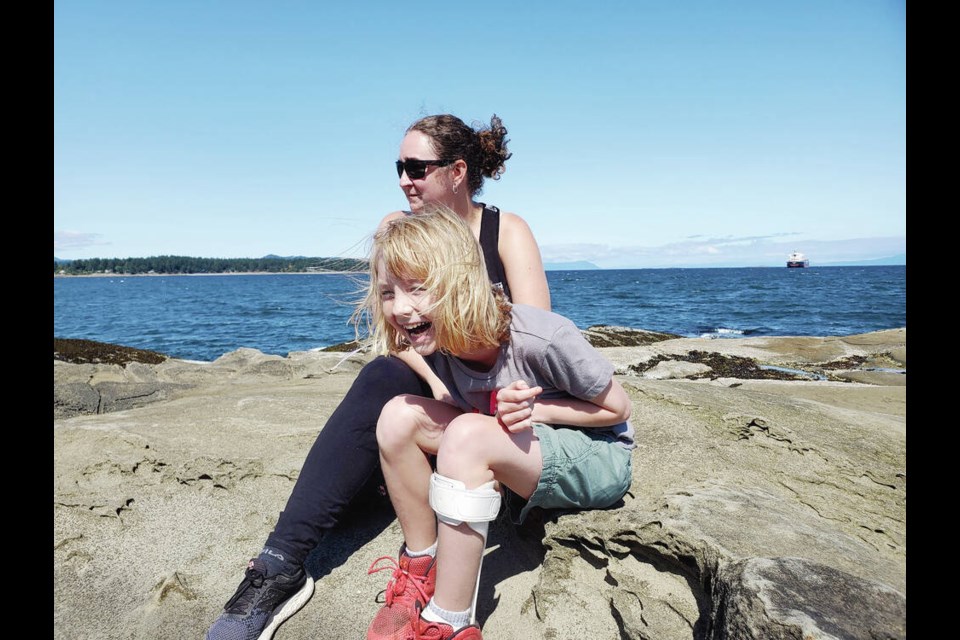A genetic blood disorder that had only limited effect on other family members turned life upside down for Autumn Techen of Nanaimo.
She was nine when a bad headache sent her into her parents’ room early one morning in December 2020. She had what seemed to be a seizure and began to vomit, and her father, Niki, rushed her to the hospital.
The symptoms were the result of hereditary hemorrhagic telangiectasia, or HHT, which runs on Niki’s side of the family.
Autumn was found to have an abnormal grouping of the blood vessels in her brain, and it had ruptured.
It wasn’t known if she would live, much less walk or talk again.
She is now almost 12 and has had what doctors call a miraculous recovery.
“It’s been quite the journey,” said Niki.
Taking the family through that journey was a health-care system and a treatment regimen that have had a huge impact in restoring Autumn’s quality of life, Niki said. “I love doctors,” he said. “Doctors are literally life-saving.”
He lauded the brain-injury program and in-home services that have helped the family. The Victoria Hospitals Foundation Emerge Stronger Campaign is currently raising $10 million for equipment to support a wide range of medical needs — including the post-surgical treatment that Autumn received from Dr. Paul Winston.
It features a portable ultrasound device that can be used right at the bedside and helps pinpoint which nerves to freeze with nitrogen gas to ease a patient’s pain.
After first going to Nanaimo Regional General Hospital following her 2020 episode, Autumn was flown the same day to B.C. Children’s Hospital in Vancouver and underwent immediate brain surgery.
About a week after pulling through the operation, she was transferred to the Sunny Hill Health Centre, also in Vancouver, for rehabilitation. It was then that Niki and his wife, Katie, received the news about Autumn possible prognosis.
“Nothing was for certain at that point,” Niki said.
Autumn was in Vancouver until April, dealing with the ongoing spasticity resulting from her condition, which made the muscles rigid in one of her arms and a leg. Botox injections, although painful, provided relief.
About a year later, she was referred to Winston, Island Health’s medical director of rehabilitation and transitions at Victoria General Hospital, to see if she would be a candidate for his locally developed treatment for spasticity.
It turned out that she was, and the treatment had an almost immediate effect on her leg function and her capacity to extend her arm.
“It has been a massive help for Autumn ever since,” her father said. “Her abilities to move around, it’s just gotten so much better.”
Autumn will go for another round of treatment in May that will hopefully allow her arm to stretch out even more.
Winston’s research project is one of five such projects being supported by the Emerge Stronger Campaign, and will be getting $88,000.
Niki said Autumn is now back at school and is at her grade level — Grade 6 — in “pretty much everything, except for dodgeball.”
“The only thing that is a little bit of a challenge for Autumn sometimes is her focus.”
She has an educational assistant working with her for safety reasons, Niki said.
“It’s just in case something should happen, but Autumn is keeping up with most things.”
He said that Autumn has ongoing physiotherapy and speech therapy, and is able to take part in gymnastics like her younger sister, nine-year-old Hazel.
The Emerge Stronger Campaign can do so much good — such as helping to advance the treatment Autumn received — and deserves the public’s support, Niki said.
Contributions to the campaign can be made through the Victoria Hospitals Foundation website at victoriahf.ca or by calling 250-519-1750.
jbell@timescolonist.com
>>> To comment on this article, write a letter to the editor: letters@timescolonist.com




